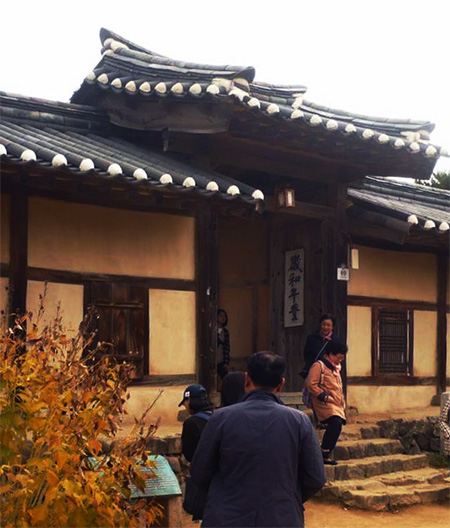

河回村・忠孝堂での日韓外交関係についての夢想篇であります。
この家は秀吉の朝鮮出兵時の李氏朝鮮の宰相を務めていた人物の旧家であり、
このポイントが今日に至る日韓関係に思いを至らせる。
日本側「わが国の太閤殿下が明国に討ち入るに際し貴国を通行したい」
朝鮮側(柳宰相)「それは貴国の国としての意思であるのか、日王の国書は?」
「わが国は太閤殿下の支配される国であり実質的に太閤が国の意思である」
「そも、太閤なる人物はどういった王族か?」
「いや王族ではない。出自は水飲み百姓から大出世された方である・・・」
「これは異なことを承る、国の意思が卑賤の者の意のままとは・・・」
「わが国では武が政を支配している。事実上の国王である。」
「そんな野蛮な輩の申すことに従うなどは礼節への不義の至りである」
「いや、だから、実質的な権力者なのだから・・・」
「そのような筋の通らない話は承知しかねる」(プンプン)
・・・天皇も朝鮮からすれば「日王」であって朝鮮王と同格としている。
そもそも天皇という呼称自体も中国皇帝に対して不遜であるとみなし、
日本という国は蛮国であり儒教的礼節のかけらもないと内心で卑しんでいた。
朝鮮王と同格という認識でさえ朝鮮側からすれば「外交的配慮」なのだ。
そういう事情すら理解しないと日本との交渉の難しさを思い知る。
文禄の役での事前外交交渉とはこんなものだったように思われる。
往古、中国皇帝臨席の国際会合で日朝での「席次争い」もあったという。
儒教が支配的思想である朝鮮の社会では日本のような自由闊達な国には、
秩序を持つ東アジア的国際感覚を「教える」態度が濃厚だったに違いない。
が、日本は対中国外交で比較的には優位な立場を確保してきている。
そもそも「日本」という国号を中国皇帝に認めさせたり、
聖徳太子の「日出ずる国、日沈む国」国書など朝鮮からすれば
ほとんど離れ業のような外交実績に羨望する部分があったに違いない。
海を隔てている列島と、地続きの半島の地政学的相違。
中国国家にして見れば「冊封」という支配体制の効力と
その維持のために強力な思想的武器である儒教の効用と思えたか。
現代でも「孔子学院」は独裁権力の武器として利用されている・・・。
一方で日本側外交団には明への侵攻を呼号する秀吉の怒声が背中から聞こえて、
目の前の朝鮮側の事大主義、儒教的秩序重視というか、
非現実的な硬直した対応を受けながら、次第に開戦やむなしに傾いていった。
・・・河回村に当時の宰相がいたことを知ってこうした国際関係を想起した。
写真は忠孝堂の入口・門の様子。
塀から一段上げられた瓦葺きの屋根造作が身分制度を強くアピールし、
さらに大庁といわれる格式的スペース、そして高欄という装置。
儒教的東アジア世界認識が色濃く建築表現されているのだと伝わる。
この河回村では瓦屋根の両班住宅と、草葺きの一般住宅に分かれ、
後者は両班住宅に付随するような配置計画になっている。
まことに「事大主義」にどっぷりと浸かった様式。
強固な身分格差社会がながく維持されてきたことがわかる。
English version⬇
[Confucianism / Sadaejuui and Japan-Korea Diplomacy Reminiscences of South Korea’s Andong Hahoe Village-7]
This is a dream about diplomatic relations between Japan and South Korea at Andong Hahoe Village and Tadatakado.
This house is the old house of the person who was the Chancellor of Mr. Lee when Hideyoshi sent troops to Korea.
This point violently stirs up delusions and does not stop.
Japanese side “I want to pass through your country when His Highness Taiko of Japan attacks Ming dynasty.”
Korean side (Chancellor Yanagi) “Is that your intention as a country, what is the national book of the Japanese king?”
“Japan is a country controlled by His Highness Taiko, and Taiko is essentially the will of the country.”
“What kind of royal family is Taiko?”
“No, I’m not a royal family. I’m from a water-drinking peasant who made a big success …”
“This accepts something different, the will of the country is the will of the cowardly …”
“In our country, Takeshi controls the politics. He is the de facto king.”
“Following what such a barbaric person says is an injustice to politeness.”
“No, that’s why I’m a real power person …”
“I don’t understand such a story that doesn’t make sense” (Punpun)
… The emperor is also a “Japanese king” from the perspective of Korea, and has the same rank as the Korean king.
In the first place, the name of the emperor itself is considered to be irreverent to the Chinese emperor.
The country of Japan was a barbaric country, and it was inwardly humbled without a piece of Confucian etiquette.
Even the recognition that it is the same as the King of Korea is “diplomatic consideration” from the perspective of Korea.
If you do not understand even such circumstances, you will realize the difficulty of negotiations with Japan.
It seems that the pre-diplomatic negotiations in the role of Bunroku were like this.
In ancient times, it was said that there was a “seating order battle” between Japan and North Korea at an international meeting attended by the Chinese emperor.
In Korean society, where Confucianism is the dominant idea, in a free-spirited country like Japan,
There must have been a strong attitude of “teaching” an orderly East Asian international sense.
However, Japan has secured a relatively superior position in diplomacy with China.
In the first place, letting the Chinese emperor recognize the country name “Japan”
From the perspective of Korea, such as Prince Shotoku’s “Country of the rising sun, country of the setting sun”
There must have been a part of envy in the diplomatic performance, which was almost like a feat.
Geopolitical differences between the archipelago that separates the sea and the peninsula that connects the land.
For the Chinese nation, the effect of the control system called “book seal”
Did you think it was the utility of Confucianism, a powerful ideological weapon to maintain it?
Even today, “Confucius Institute” is used as a weapon of dictatorship.
On the other hand, the Japanese diplomatic corps heard Hideyoshi’s angry voice calling for an invasion of Ming from his back.
Sadaejuui on the Korean side in front of us, emphasizing Confucian order
While receiving an unrealistic and rigid response, he gradually leaned toward the start of the war.
… I remembered this kind of international affairs when I learned that there was a Chancellor at that time in Andong Hahoe Village.
The photo shows the entrance and gate of Chukodo.
The tiled roof structure raised from the wall strongly appealed the identification system.
In addition, there is a formal space called the Great Office, and a device called a balustrade.
It is said that the Confucian East Asian world recognition is strongly expressed in architecture.
In this village, there are two groups of houses with tiled roofs and general houses with thatched roofs.
The latter is a layout plan that accompanies both groups of houses.
A style that is truly immersed in “Sadaejuui”.
It can be seen that a strong social status disparity society has been maintained for a long time.
Posted on 8月 25th, 2021 by 三木 奎吾
Filed under: 住宅マーケティング, 日本社会・文化研究







コメントを投稿
「※誹謗中傷や、悪意のある書き込み、営利目的などのコメントを防ぐために、投稿された全てのコメントは一時的に保留されますのでご了承ください。」
You must be logged in to post a comment.